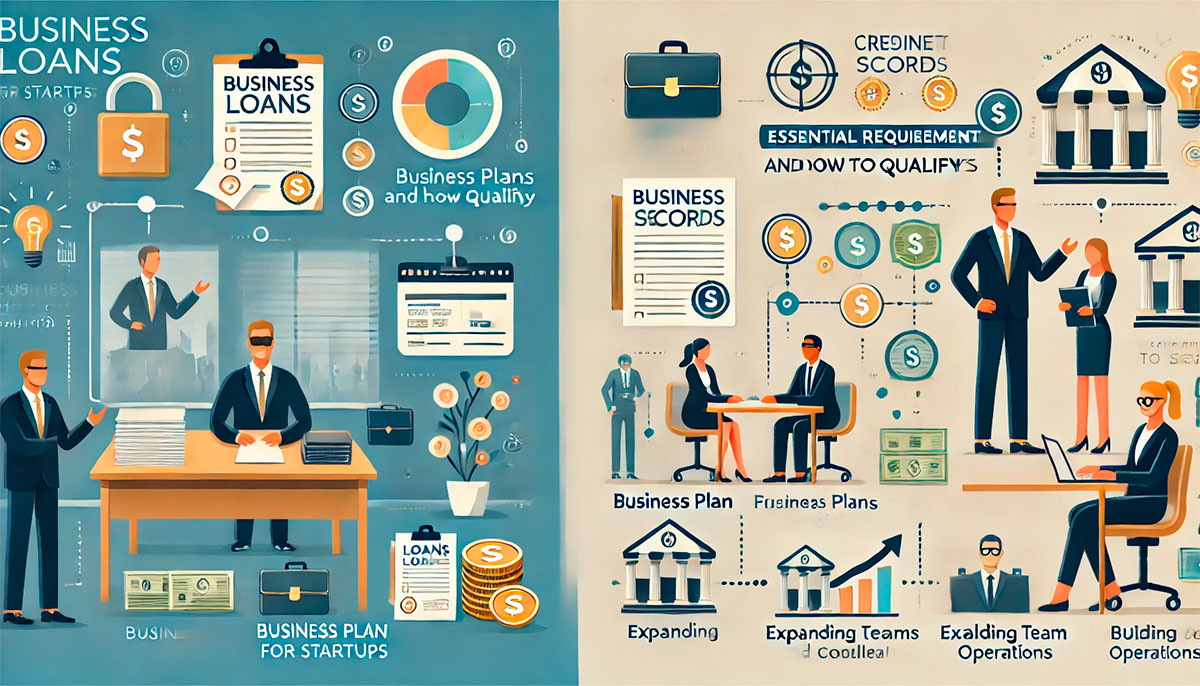
Business Loans for Startups: What You Need to Qualify
Starting a business is an exciting venture, but securing the necessary funding can often be a challenge for new entrepreneurs. Many startups look to business loans as a way to cover initial costs, invest in growth, and ensure stable cash flow. However, qualifying for a business loan as a startup comes with its own set of hurdles, especially since lenders often prefer working with established businesses with proven financial histories. To improve your chances of securing a loan, it’s essential to understand what lenders look for and how to meet their qualifications.
Understanding the Challenges for Startups
Limited Financial History
One of the main challenges for startups is the lack of financial history. Lenders rely on a business’s track record to evaluate its ability to repay loans, but new businesses don’t have this history to demonstrate their stability. Without established revenue streams and proven cash flow, lenders may see startups as risky investments.
Lack of Collateral
Many lenders require collateral to secure a loan, especially for startups. Collateral provides a safety net for the lender in case the borrower defaults. However, startups often lack significant assets, such as real estate or equipment, to offer as collateral. This can make it difficult for new businesses to qualify for traditional loans.
Uncertain Business Models
Startups often operate with untested business models. Lenders may hesitate to provide funding for businesses that are still in the early stages of development, especially if the market demand or profitability of the business is uncertain. Startups must demonstrate a well-researched business plan to alleviate some of these concerns.
Key Factors Lenders Consider
Personal Credit Score
In the absence of a strong business credit history, lenders will often look at the personal credit score of the business owner. A high personal credit score can signal to lenders that the owner has a history of managing debt responsibly, which can offset some of the perceived risks of lending to a startup. Startups should aim for a credit score of at least 680 to improve their chances of qualifying for a loan with favorable terms.

Strong Business Plan
A well-prepared business plan is one of the most critical components when applying for a startup loan. The plan should clearly outline the business’s goals, target market, competitive analysis, revenue projections, and operational strategy. Lenders want to see that the startup has a clear path to profitability and a realistic plan for repaying the loan. A strong business plan can help overcome concerns about the business’s lack of history.
Revenue Projections
Lenders need to see that the startup has the potential to generate enough revenue to cover its loan repayments. Even if a business is in its early stages, providing detailed revenue projections based on market research and industry trends can help build lender confidence. Be prepared to justify your revenue estimates with data and realistic assumptions.
Types of Loans Available for Startups
Small Business Administration (SBA) Loans
The SBA offers government-backed loans specifically designed for small businesses, including startups. The most popular option is the SBA 7(a) loan, which provides funding for various business purposes, from working capital to equipment purchases. The SBA partially guarantees the loan, reducing the risk for lenders and making it easier for startups to qualify. However, the application process can be lengthy and requires extensive documentation.
Microloans
Microloans are smaller loans, typically under $50,000, designed for startups and small businesses that need a modest amount of capital. These loans are often easier to qualify for and are available through nonprofit organizations or community lenders. Microloans can be an excellent option for startups that don’t need large sums of money but require a financial boost to get started.
Business Lines of Credit
A business line of credit gives startups access to a pool of funds that they can draw from as needed. Unlike a term loan, where the borrower receives a lump sum, a line of credit allows businesses to borrow only what they need and pay interest on the amount used. This flexibility makes it ideal for managing cash flow or handling unexpected expenses.
How to Improve Your Chances of Qualifying
Build a Strong Credit Profile
If your personal or business credit score is not where it needs to be, take steps to improve it before applying for a loan. Pay off existing debts, resolve any late payments, and regularly monitor your credit reports to correct any errors. A higher credit score can significantly improve your chances of qualifying for a loan and securing better interest rates.
Seek Alternative Funding Sources
If traditional loans are difficult to secure, consider exploring alternative funding options. Crowdfunding, venture capital, and angel investors are potential sources of funding for startups. These options may come with different requirements and expectations, such as giving up equity, but they can provide much-needed capital for new businesses.
Demonstrate Industry Expertise
Lenders are more likely to approve loans for startups that are run by owners with industry experience. If you can demonstrate that you understand the market, have relevant experience, and have built a network of industry connections, lenders may be more willing to take a chance on your business.
Conclusion
Qualifying for a business loan as a startup can be challenging, but with the right preparation, it’s possible to secure the funding needed to launch or grow your business. Focus on building a strong personal credit score, preparing a detailed business plan, and providing realistic revenue projections. Additionally, explore all available loan options, including government-backed loans and microloans, to find the best fit for your business needs. With careful planning and persistence, you can improve your chances of securing a loan that helps your startup thrive.
As you navigate the loan application process, remember that thorough preparation and careful planning are key to making informed decisions that benefit your business. Whether you are seeking funding for expansion, equipment purchases, or working capital, avoiding these common mistakes will help you achieve your financial goals with confidence.
You May Also Like

How Business Loan Terms Can Shape Your Growth Strategy
December 11, 2024
Expanding Your Business with Short-Term vs. Long-Term Loans
June 15, 2024
